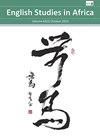Millenarian Modernism in H. I. E. Dhlomo’s The Girl who Killed to Save
IF 0.5
4区 文学
0 LITERATURE
引用次数: 0
Abstract
Abstract This essay takes as its starting point the final scene of H. I. E. Dhlomo’s The Girl who Killed to Save (1935). Ostensibly an account of ‘Nongqause the Liberator,’ the prophet behind the Cattle Killing of 1856–1857, Dhlomo’s play presents ‘not merely a work of historical recovery or a reflection of increasing segregation but also an engagement with the full range of nationalist imaginings at work in the New African era’ (Wenzel 83). In this regard, it is pertinent to recall that a more immediate precursor for the millenarianism presented in the play was the arrest of Nontetha Nkwekwe in 1922 and her death in the same year of its publication. Like Nongqause, Nkwenkwe was a millennialist prophet. Responding to the Spanish Influenza, Nkwekwe’s prophecies eventually provoked the South African authorities to incarcerate and then institutionalize her. Given the increased attention on the influenza as a shaping influence on the modernism of 1922 and after, this essay figures Dhlomo with an expanded global modernism that engages more explicitly with its millenarian correspondents.h·i·e·迪洛莫《为拯救而杀戮的女孩》中的千禧年现代主义
本文以H.I.E.Dhlomo的《为拯救而杀人的女孩》(1935)的最后一幕为切入点。Dhlomo的剧本表面上是对1856-1857年杀牛事件背后的先知“解放者农加兹”的描述,“不仅是一部历史复兴的作品或对日益严重的种族隔离的反映,而且是对新非洲时代各种民族主义想象的参与”(Wenzel 83)。在这方面,值得一提的是,剧中呈现的千禧主义的一个更直接的前兆是1922年Nontetha Nkwekwe被捕,并于该剧出版的同年去世。和农古斯一样,恩昆克韦也是千禧一代的先知。为了应对西班牙流感,Nkwekwe的预言最终促使南非当局将她监禁,然后将其制度化。鉴于人们越来越关注流感,认为它对1922年及以后的现代主义产生了影响,本文将德罗莫描绘成一个扩展的全球现代主义,更明确地与千禧年的通讯员接触。
本文章由计算机程序翻译,如有差异,请以英文原文为准。
求助全文
约1分钟内获得全文
求助全文

 求助内容:
求助内容: 应助结果提醒方式:
应助结果提醒方式:


